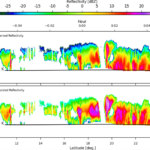He joins 469 other scientists, engineers and innovators who received the distinguished lifetime honor within the scientific community this year.
Xin-Zhong Liang was recently named a 2024 Fellow of the American Association for the Advancement of Science (AAAS). He was one of two CMNS professors honored with this award, alongside Ann Wylie.
“These newly elected AAAS Fellows highlight our CMNS faculty members as catalysts for discovery that leads directly to positive impacts on our local, national and global communities,” said CMNS Dean Amitabh Varshney. “Congratulations to Ann and Xin-Zhong on this tremendous honor.”
UMD’s 2024 Fellows, three in total, join a class of 471 scientists, engineers and innovators who received this distinguished lifetime honor within the scientific community.
“This year’s class of Fellows are the embodiment of scientific excellence and service to our communities,” Sudip S. Parikh, AAAS chief executive officer and executive publisher of the Science family of journals, said in an announcement. “At a time when the future of the scientific enterprise in the U.S. and around the world is uncertain, their work demonstrates the value of sustained investment in science and engineering.”
Xin-Zhong Liang
 Liang, a professor in the Department of Atmospheric and Oceanic Science (AOSC) with a joint appointment in the Earth System Science Interdisciplinary Center (ESSIC), was elected AAAS Fellow “for innovative, pioneering leadership in developing regional modeling capabilities for understanding climate change impacts on water resources and various societal sectors.”
Liang, a professor in the Department of Atmospheric and Oceanic Science (AOSC) with a joint appointment in the Earth System Science Interdisciplinary Center (ESSIC), was elected AAAS Fellow “for innovative, pioneering leadership in developing regional modeling capabilities for understanding climate change impacts on water resources and various societal sectors.”
“I am deeply honored to be elected as an AAAS Fellow, and this recognition truly reflects the collective efforts of my exceptional team and collaborators,” Liang said. “Advancing interdisciplinary research requires broad collaboration, and I am grateful for the opportunity to work with such dedicated colleagues. Their contributions have been instrumental in developing innovative modeling capabilities to address critical challenges in climate, water, agriculture and health.”
Liang’s efforts to develop integrated Earth system models span various fields, including atmosphere, ocean and land physics and chemistry; biogeochemistry; terrestrial hydrology; climatology; and agriculture.
His most recent work focuses on developing the Dashboard for Agricultural Water Use and Nutrient Management (DAWN), a predictive decision-support tool for sustaining food and energy crop production in the U.S. Corn Belt that extends from western Ohio to eastern Nebraska and northeastern Kansas. DAWN uses regional modeling capabilities for agricultural decision-support, and the team is expanding its application to the food-energy-water nexus, public health and agricultural economy.
“The AAAS Fellowship aptly recognizes Xin-Zhong Liang’s pioneering development of regional Earth system models, which have enabled cutting-edge advancements in atmosphere-ocean-biosphere-land surface interaction science to inform societal decisions on conserving precious water and energy resources,” said AOSC Chair Suman Nigam. “Xin-Zhong brings the same zeal to classroom teaching and mentoring. AOSC is privileged to have him as a colleague.”
Global to regional climate and Earth system models developed or improved by Liang have been used to improve weather forecasting and study climate variability, predictability, impacts, and feedback on timescales that range from seasons to decades.
“In addition to its scientific merit, the work done by Professor Liang and his colleagues also has direct relevance for local constituencies and economies everywhere,” said ESSIC Director Lars Peter Riishojgaard. “While much climate research focuses on global-scale impact, Dr. Liang and his group have specialized in translating this into specific information about what changes can be expected at the local level, which makes it particularly relevant for decision-makers. Their focus on water-related issues is also important because phenomena like floods and droughts or even changes in precipitation patterns tend to have a higher economic impact than most other changes in weather or climate patterns.”
Liang is a Fellow of the American Meteorological Society and American Geophysical Union, and he received the CMNS Board of Visitors Distinguished Faculty Award in 2022. Liang has been awarded over $26 million in research grants and published over 200 peer-reviewed journal articles.
He joined UMD as a professor in 2011 from the University of Illinois at Urbana-Champaign. He earned his Ph.D. in atmospheric dynamics in 1987 from the Chinese Academy of Sciences and a B.S. in meteorology from Hangzhou University (now part of Zhejiang University) in China.
This article was adapted from a piece written by Abby Robinson and originally published on the CMNS website.





